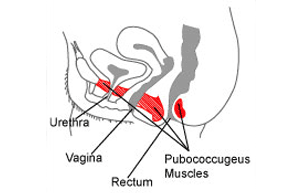Approximately 30 million men in the United States have trouble achieving or maintaining an erection, and though there are effective treatments for erectile dysfunction, most of these men do not seek treatment...for as expert as we have become at watching sex in the movies and on television, we have much to learn about having open and candid conversations about sexuality.
Dr. Francois Eid has no problem talking about sex. As the Director of Advanced Urological Care, and Clinical Associate Professor of Urology at Weill/Cornell Medical College in New York City, Dr. Eid must speak openly with patients on the subject, and he enjoys it. "It's an interesting part of being a doctor. You get to be intimate with people right away."
For Dr. Eid, treating sexual dysfunction is not synonymous with giving men the golden key to a fabulous new sex life. Instead, it is about helping men to feel normal. Below, Dr. Eid dispels some common misconceptions about the treatment of sexual dysfunction, and talks about how he approaches the sensitive topic of sexuality with his patients.
How did you become an expert in the area of sexual dysfunction?
In my early days practicing urology, I noticed that a lot of doctors were not comfortable talking about sex, and a lot of patients were not comfortable talking about it either. So doctors started to refer patients to me when they had sexual concerns. "Go see Eid." And that's how I became an expert in sexual dysfunction.
But it wasn't until I'd seen five or six thousand patients that I began to understand the real problem that most men have with losing their ability to have an erection. A lot of people assume that it's all about sex and manhood. But the primary difficulty felt by most men in this condition is that they do not feel normal anymore. And my job, as a doctor, is to help men feel like themselves again. Feel normal.
Are there a lot of misconceptions about why men seek treatment for erectile dysfunction?
People see it as a social phenomenon. What they overlook is that losing use of your penis is like losing your eyesight. When Viagra received FDA approval, people started writing all sorts of articles about how sex is no longer romantic, and all men have to do is take a pill and they get an erection -- they don't need foreplay, and so on. They portrayed treatment for sexual dysfunction as something dirty, for lecherous old men. It really annoyed me, because there seemed to be a very superficial knowledge of what erectile dysfunction represents to an individual.
A man who cannot have an erection is not thinking, "I need to be able to make love Saturday night." He is thinking, "I can't do it anymore. Monday, Tuesday, never again." He has lost a normal part of his functioning.
What is that experience like?
Talking with couples about erectile dysfunction? There's a lovely thing that happens. At first, the conversation is often heavy and filled with resignation and sadness. But often, after two or three minutes, we're laughing about the erectile dysfunction. And when you start laughing, it's almost like the job is finished. It has put things into perspective. There are treatment options. He is now in control. He is not a victim of the situation anymore.
Can you give an example?
Sure. I had a patient who had had radiation therapy for prostate cancer. He was in his seventies, and he developed erectile dysfunction, and for two years after that, he was really miserable. And apparently, his erectile dysfunction was a big complaint. So when he came in with his wife, her primary goal was to get him to stop complaining.
We started to talk about the mechanics of the sex they were having. And you have to admit it, it's funny. I mean, here you are all together in this consultation, and you're all picturing the couple in the bedroom, and it's romantic, and they start foreplay, and he goes to insert his penis, and it's limp. But instead of skipping over the story because it's uncomfortable, I ask for more detail. We really get into the nitty-gritty. And then it gets to the point where it's not uncomfortable anymore.
So what did you talk about next with the couple?
At that point, we started talking about treatment options, and this gentleman just said, "You know what? I'm happy the way I am. And it was great talking to you." And he was no longer a victim because he had made a decision. He was back in control of his own body. When they walked out, his wife was relieved, and he had discovered a renewed sense of dignity. And two weeks later they called me and said that they had great sex. That's amazing. Yes. But without intercourse. So that was great. And because he had recovered his dignity, he now became attractive to her like he was before.
What do people learn from going into such detail with you about sex?
When they come to me, they're hoping that their erectile dysfunction will go away by itself. By dwelling on the details of the sexual dysfunction, and being very specific about it, and starting to laugh about it, they're able to accept the dysfunction. This is you now. It's permanent. And once they realize that it's permanent, then they can stop hoping, and start really considering what they want to do about it.
Sometimes a man has erectile dysfunction, but he and his partner are having great sex anyway. And those couples are easy to treat because there's great communication and a lot of love. So it's just a matter of finding what they like and what works best for them. So again, erectile dysfunction is not about sex. There are couples who have erectile dysfunction who have great sex.
Have you grown more skillful in your conversations with patients?
Absolutely. Every year I learn more and more how best to do it. Every patient is different and that's what makes it interesting. My goal is to encourage the patient to talk, and to explain my goal as a doctor. And my goal is to offer a treatment that will make him feel the most normal. It's not about giving him the treatment that will enable him to have an erection so that he can make love. When people start to understand that, then they are more open to treatment options.
Are wives or partners of men with erectile dysfunction often suspicious of treatment?
I often have patients that come in and the husband is interested in the penile implant, which is a completely internal mechanism that allows a man to have a full erection at any time. And often the wife is cautious or worried about it. She thinks, "You're going to hurt my husband. We're going to have complications, and life is hard enough as it is." I explain that getting a penile procedure is something that one does to feel complete again, or whole. If a woman has a mastectomy, and wants breast reconstruction, her husband will love her with or without the reconstruction. But she is doing it for herself, to feel whole. It's the same thing for a penile prosthesis. A man gets it for himself.
Do you ever find that the best treatment for some couples is no treatment?
Definitely. And there are times when it is my job to talk them out of being treated.
It's very unusual work. Do you find it gratifying?
Yes. When men become informed about their condition, and proactive about treatment decisions, it can have the effect of restoring their dignity, and this is very satisfying.
I do what any doctor strives to do. Orthopedists, ophthalmologists, or cardiologists, whoever - they are trying to help people stay normal and healthy. For some reason, when it comes to erectile dysfunction, there is this stigma that gets in the way. People forget that it's just about being normal.
Dr. Francois Eid is the Director of Advanced Urological Care, and Clinical Associate Professor of Urology at Weill/Cornell Medical College in New York City.





